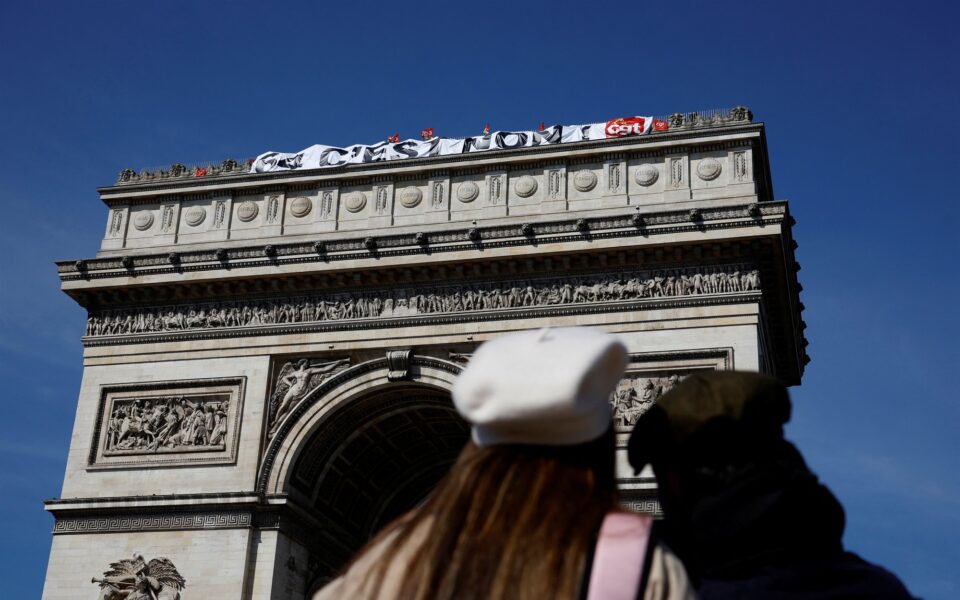What happens in France doesn’t stay in France

In recent weeks France has been shaken by constant and violent demonstrations. The reason is the increase in the retirement age from 62 to 64. The reform is highly unpopular but is key to Emmanuel Macron’s program, and what he was elected upon as president. It was not voted through in parliament, but Macron pushed it through by decree, as the Constitution allows. A motion of no confidence against his government was defeated in the parliament.
It is somewhat ironic that an increase of the retirement age to 64 should generate such fierce resistance, when in most EU countries the limit is 65 or 67. The reform seeks to render the pension system sustainable, so as not to be forced to burden the economically active population with higher contributions (as the Spanish government recently did). Some governments would rather eschew the pain of pension reform (a policy of pain avoidance and procrastination by Greek governments pre-2009 crash-landed the country in steep pension cuts and prolonged austerity in 2010). In rapidly aging Italy, the populist coalition of Salvini and the Five Star Movement in 2018 revoked the age limit increase to 67 that had been painfully implemented by Fornero and Monti in 2011 – Italian governments have avoided meddling with the pension system ever since, even though it remains highly unsustainable. “Leave it for later,” political cunning dictates. But Macron is far more ambitious than that for his country.
But France defends its exceptionalism with a well-known intolerance of reform, penchant for protest, and proclivity toward a romanticization of violence. In part, pensions are just the trigger. The conflicts have moved from Paris to small towns, burdened by the rising cost of living and fuel prices. From the neglected towns (Le Pen’s strongholds) sprang the Yellow Vests in 2018 – France has its own incoherent province too…
The French paradox is not the root causes but France’s privileged position in dealing with them. Job insecurity – but unemployment is at 7%, the lowest in 15 years. Anti-globalization – France is predominantly a vector of state autonomy and a pursuant of EU autonomy to moderate globalization’s adverse effects. Income inequality – but income inequality in France is among the lowest in Europe, the French education and health system enviable, France posting some of the highest rates of public and social spending. The greater the social acquis, the fiercer the coalition mobilizing in its defense.
The protest is directed against the “authoritarianism” and “arrogance” of President Macron. In the French version of anti-elitism, the above stereotypes are alternated with their exact opposites: When the president is not authoritarian and arrogant, he is weak and indecisive. In any case unpopular. French presidents are unloved by the French people. Once they get elected, they are disliked until they are gone. Often, the resentment of presidential “arrogance” is the price of executive effectiveness.
If Macron caves in to the protests, his credibility will be irreparably damaged, along with his leadership role in Europe
Mass demonstrations are not just a release of social tension. They are factors of radicalization, offering an experiential school in extreme political protest and clashes with the police. Melenchon seeks to expand and consolidate his party’s electoral appeal by locking broader social strata into leftist radicalization. The brutality of the French police force helps.
The big picture of what goes on in France should be of broader European concern. France’s internal reforms are typically directly linked to France’s influence in Europe. Mitterrand adopted the “franc fort,” abandoning wage increases to defend France’s standing against Germany. Macron negotiated domestic reforms with Merkel in exchange for reform of the eurozone. Germany did not follow up, but with the Recovery and Resilience Fund Macron had the last word. France’s interests, even in their hegemonic version, are identified with a strong Europe. Hollande fought hard to prevent Grexit; Macron led the joint EU response to Russia’s aggression in Ukraine, after having exhausted all diplomatic efforts; and today Macron is pushing for a common EU industrial and technology policy, in defense against overseas protectionism.
From Europe’s common defense to fiscal integration, Macron’s policies are fully aligned with the strategic aspirations for a stronger Europe, which happen to be identical to those of Greece. For Europe, Macron is France at its best, but Macron’s problem is France. If Macron caves in to the protests, his credibility will be irreparably damaged, along with his leadership role in Europe.
Le Pen is the big winner so far, reaping the benefits of protests without identifying with the vandalism, and in the 2027 election she will ride the wave of counter-reform. She is the second most popular politician in France, above Macron. Left-wing extremism carries water in Le Pen’s mill – anti-Europeanism and the abolition of the 64 retirement age. If Le Pen ends up succeeding, the implications for Europe would be devastating.
George Pagoulatos is a professor at the Athens University of Economics and Business and visiting professor at the College of Europe in Bruges.




